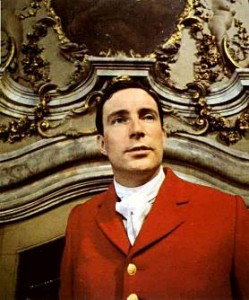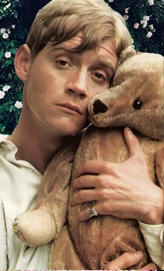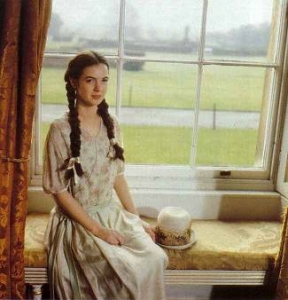 I must first make it clear that I actually like Bridey. He’s affable enough. He’s a comic character, and is not an apparently evil person. He doesn’t do anything wrong as such…and there lies the problem: he doesn’t do anything at all.
I must first make it clear that I actually like Bridey. He’s affable enough. He’s a comic character, and is not an apparently evil person. He doesn’t do anything wrong as such…and there lies the problem: he doesn’t do anything at all.
It is true that Bridey is not a drunken homosexual or an promiscuous adulterer, but it is all too easy to mistake not doing anything wrong with virtue. We should not ask ourselves, “What evil does Bridey do?” but “What good does Bridey do?”
I believe his are the sins of omission, not commission. What should Bridey do? First of all, as the eldest son, he should take charge in his fathers’ absence. At first we see him being involved with the country gentry and exercising a kind of leadership at the hunt, and hosting the locals as the Lord of the manor should, but as the story progresses Bridey withdrawls further and further into his own little, self absorbed world, allowing Rex and Julia to take over Brideshead. He retreats to ‘two little rooms in the attic’ next to Nanny Hawkins, where he collects matchboxes. Is this not just as much an escape from reality and duty as Sebastian’s and his father’s flight?
In his father’s absence a man of Bridey’s privilege, education and influence should be a leader of men. He should be a Member of Parliament. He should pursue and marry a beautiful and intelligent woman of his own class who could successfully stand at his side, father a brood of children to fill that house and be châtelaine of Brideshead. He should use his wealth and influence to fight the good fight in all sorts of worthy causes. Instead he abdicates and allows the vulgar bounder Rex Mottram to usurp his place. Bridey withdraws into a world of intellectual and spiritual superiority where he never fails because he has never tried. He never sins, but neither has he really lived life. He never makes a mistake, but then he never makes anything. His life is not so much pure as sterile. He obeys the letter of the law, but misses the Spirit entirely. He is the perfect elder son in the parable of the prodigal son–the one who stays at home and points the self righteous finger at others.
He practices a Catholic faith that is dry, passionless and dead. Time and again Charles tells Bridey that his faith is unattractive and dull to the point of idiocy and Bridey is impervious to the criticism. For Bridey everything is simply a point that is ‘arguable.’ Bridey’s faith is Catholic legalism, and he has used the faith as his most effective tool to marginalize the threat of reality, kill life, to kill love and to kill his family. The scene where he righteously destroys Julia’s planned marriage to Rex, and then casually inquires, “what one usually does with the bridesmaid’s dresses in such cases?” exemplifies the oblivious cruel heartlessness within the man.
Even his marriage to dear, sweet Beryl Muspratt is part of the problem, not the solution. Beryl Muspratt? He simply married a woman who could be his Nanny.
Bridey a virtuous Catholic hero? Not in my book. At best, he’s a pathetic victim of his parents’ broken marriage. At worst he’s a coward–a milquetoast who was bullied by his mother and afraid to live life for fear that he might make a mistake, and his religion was no more than a Jesuitical comfort blanket thrown over his head to help him escape reality.
The fact that he loses his rightful inheritance to live in a little house with Beryl and collect matchboxes is justice.
If we are looking for the Catholic heroes of the book we must look to the more minor characters. I reckon they are Nanny Hawkins, Cordelia and Fr. Mackay. The other Catholic heroes are Charles, Julia, Sebastian and Lord Marchmain, for though they were sinners, each one of them, in their own way, finally repent. They are the ones over whom the angels rejoice.
There now… shoot me down dear readers.











